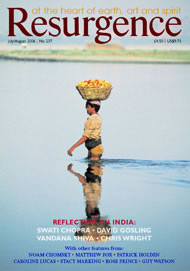OUR POLITICIANS TELL us time and again that the acts of terrorism that have so polarised the world in the last few years are not the result of views and beliefs of the vast majority of the people, but rather the acts of an extreme minority. Despite this, it seems that we sail ever closer to a complete division between ‘the West’ and ‘Islam’. This tragedy comes about neither by the will of the people, nor even by the aggression of the few, but by the ignorance of many, on both sides, of the nature and beliefs of the other.
In watching all the coverage of events around the world in the ‘War on Terror’ I realised an enormous and woeful personal sense of ignorance about many of the central issues. I realised that, to begin with, I knew nothing whatever about Islam. I had heard of the Prophet, The Qur’an, Mecca, prayer five times a day, and so on, but despite the fact that I have many friends who are Muslim, I know nothing much about their faith and how it affects their perception of the world around them. The few attempts I have made have not clarified things much either. The Qur’an is not the easiest place to start for a Christian with no understanding of the history and context of the Muslim world. Many other books I looked at focused on particular issues, obsessing on the terrorist angle or on the history of an individual nation.
Paul Grieve’s compelling and well-crafted book has proved a riveting solution to this problem. With a clear and articulate voice he narrates a history of the Muslim world: its development from the words of the prophet in Mecca and Medina in the 7th century out across the face of human progress over the globe. He examines the fundamentals of the faith, ‘the Five Pillars’, to give an impression of the religion in action. He looks at Islam in the modern world and the recent history that has shaped its evolution from Israel and Palestine to Serbia and 9/11. From this overview he takes us back into the practice of the religion so that we can gain an understanding of how inseparable the faith is from the way in which a person leads his or her daily life; how it shapes thinking, behaviour and politics with the highest moral ideals.
He reflects on the development of the faith and the different movements that have grown out of it, and he speculates on the possibilities for the future. Finally, he gives an idea of the experience of travelling in the Islamic world today, from the intricacies of how Islam may be portrayed in the arts to its architecture, treasures and most famous historical figures. The result is an objective portrait of a whole culture, from the daily religious rituals to the political intricacy of nation-states. Do you understand the difference between Sunni and Shi’a? Do you know what the Ka’bah is? Does it make sense to try to impress subjective democratic values where faith in God is more important than individual freedom or the demands of government? To what extent does our own colonial history bear the blame for many of the present problems?
In reading this fascinating book what you come to again and again is not the difference between faiths but the similarities. You see that so many of our current troubles are based around our misunderstandings rather than any true legitimate difference between the deeper values of our cultures. Most importantly, Grieve is not afraid to confront the reality that much of Western foreign policy is based on hypocritical self-interest, and thus he presents some real unbiased views on why things are as they are.
Given the problems we face in the world today, we cannot afford to continue in ignorance of each other if we are to survive. In our time the politics of the Old World order which America struggles to maintain with its ‘War on Terror’ and its pantomime of exported democracy is long since outdated and corrupt. This is a time in which we enjoy unprecedented access to information about our world and the people who live in it, and it is our collective responsibility to use it, and use it wisely. Here is one ideal opportunity.
Ulric van den Bogaerde is author of The Unexpected Visitor.







